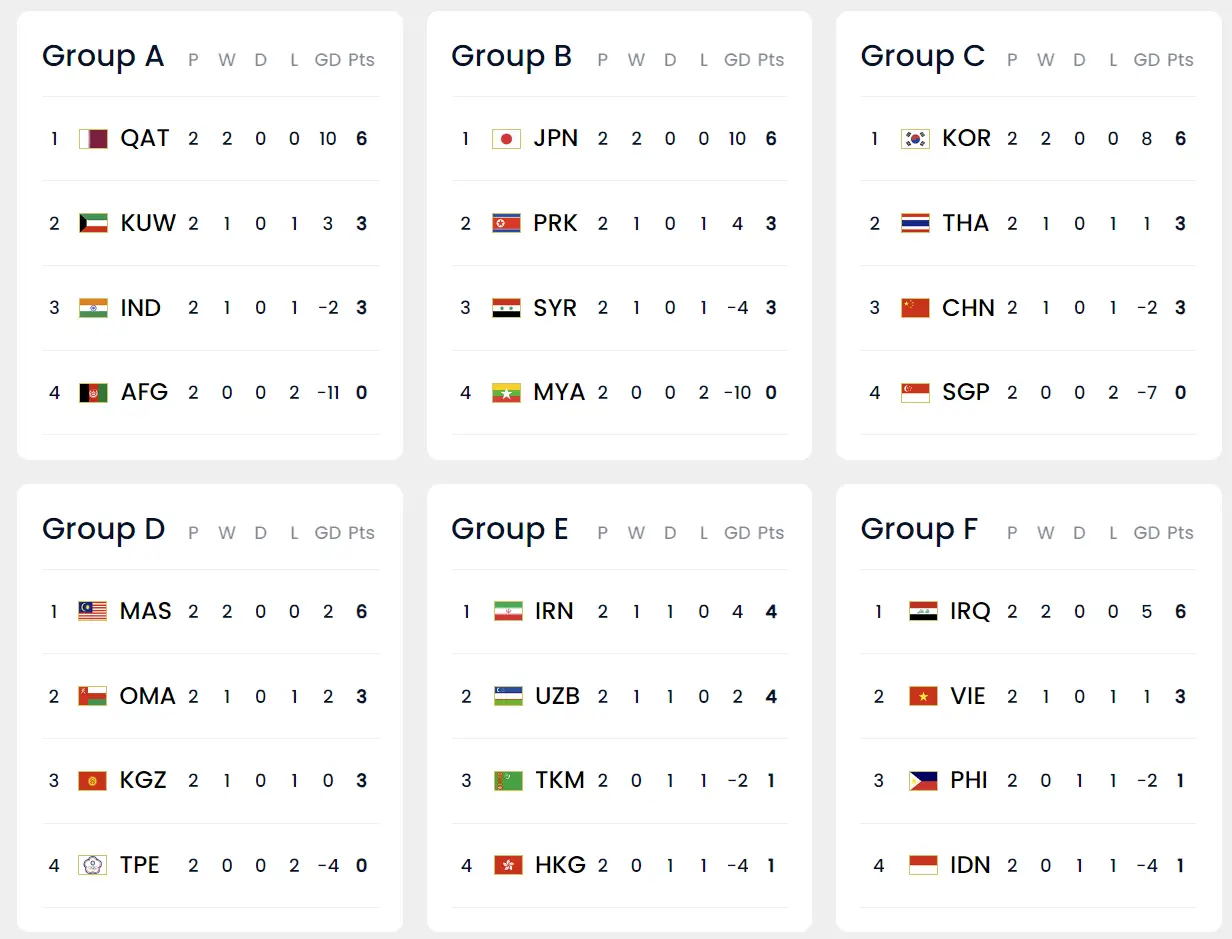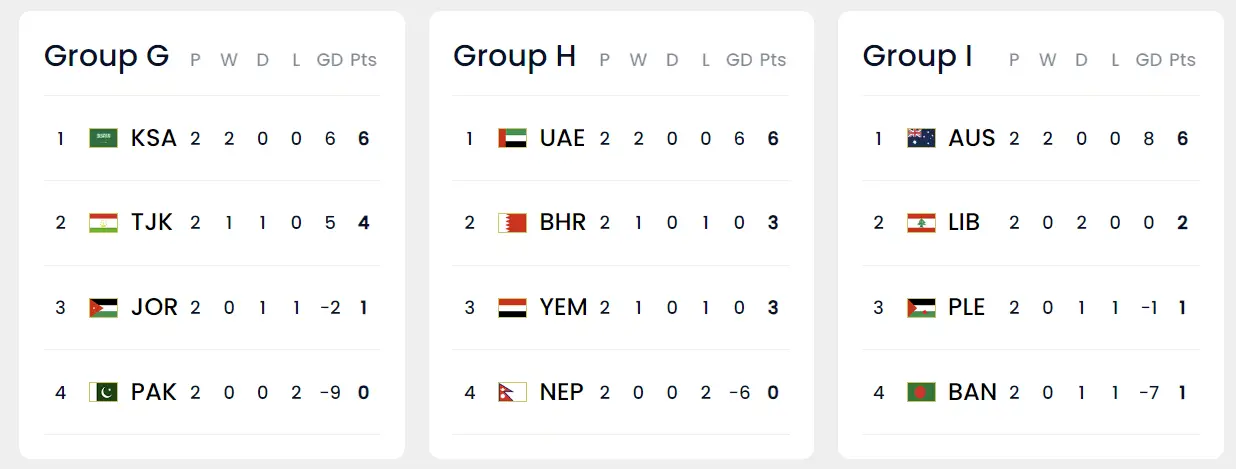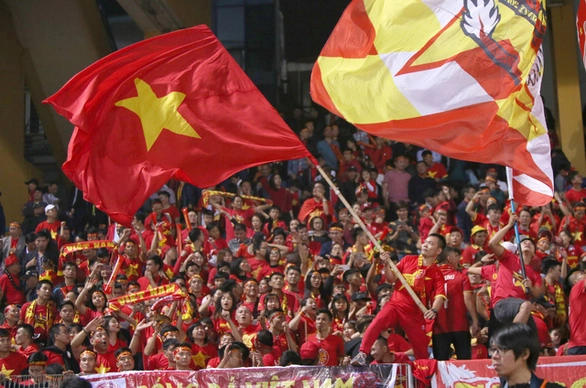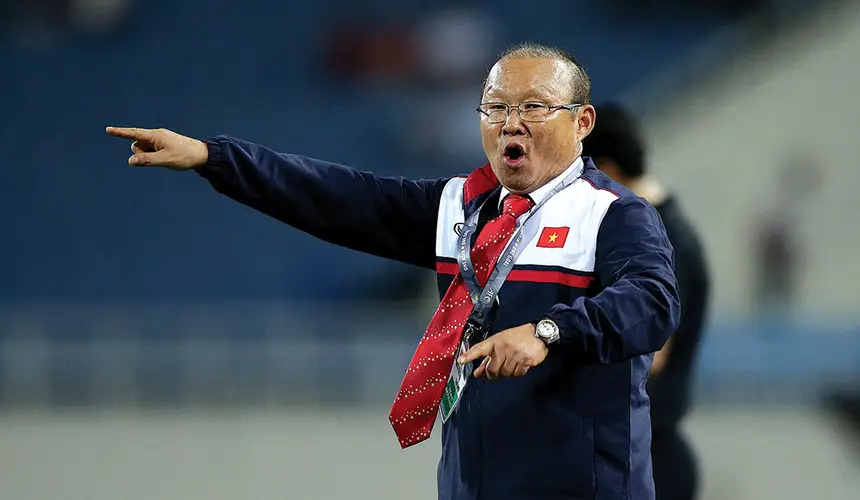The qualification process for 2026 FIFA World Cup 2026 Canada, Mexico, USA is underway across continents. A total of 48 countries will progress to the finals, and in Asia, there’s fierce competition among countries vying for the 8.5 available spots.
The initial qualifiers have ended, and the remaining 36 countries are now split into nine groups of four teams each for the second round. After two games per team, the current standings for each group are as follows.
Amidst this unfolding tournament, a notable storyline emerges—the increasing presence and impact of Korean soccer coaches in the region.


In Group D, the catalyst behind Malaysia’s rise is attributed to a Korean soccer coach.
Countries like Korea, Japan, Australia, and Saudi Arabia, seated in pot 1 in Asia, have smoothly maintained their leading positions in their respective groups, securing two victories each, just as anticipated. However, Group D has witnessed an unexpected twist with Malaysia emerging strongly, clinching two wins.
As of October this year, Malaysia holds the 137th spot in the FIFA rankings and was placed in pot 3, following Oman (72nd) and Kyrgyzstan (97th), eventually landing in Group D. Despite initial expectations, Malaysia’s triumphs against Kyrgyzstan (4-3) and Taiwan (1-0) have earned them six points, elevating them to a highly scrutinized team in this Asian qualifier.
Malaysia’s remarkable performance has sent ripples, particularly among Southeast Asian nations.
Out of the 36 countries progressing to the second round of the World Cup Asian qualifiers, 18 will advance to the third round. As of October this year, Vietnam (FIFA ranking 95th) stands as the sole Southeast Asian country within the top 18, positioned at 15th among the 36 nations.
The Southeast Asian countries—Thailand, the Philippines, Malaysia, Myanmar, Singapore, Indonesia, and others—find themselves positioned outside FIFA’s top 100 rankings. While their chances of advancing to the third round are slim, the prospects of progression remain low. However, until recently, Malaysia was perceived to be at a comparable or even lower level than these nations. Despite being early in the second round, Malaysia’s emergence as a potential contender not just for the third round but also for the World Cup finals is incredibly astonishing.
Amid Malaysia’s current surge, Korean soccer coach Kim Pan-gon plays a pivotal role. Kim Pan-gon stepped down from his role in the Korea Soccer Association’s National Team Selection Committee in early 2022 to assume coaching duties for the Malaysian national team. In less than two years, he’s achieved remarkable outcomes. Reports suggest that Kim Pan-gon’s contract with the Malaysian Soccer Association concludes in January next year, yet his coaching value has soared. While his increased value is expected due to outstanding performance, the dynamics of soccer rivalries among Southeast Asian nations significantly contribute to this surge.
The presence of three Korean soccer coaches spread across Southeast Asian countries, all within the context of regional soccer rivalries, is quite intriguing.
While their FIFA rankings might be lower and their odds of reaching the World Cup finals slimmer, the ardor for soccer in Southeast Asian nations rivals that of Europe or South America. Furthermore, given the comparable soccer prowess among geographically neighboring countries, the emergence of rivalries seems almost inevitable. Losing to Southeast Asian nations presents a different scenario compared to faltering against Tier 1 Asian soccer nations like Korea, Japan, and Australia.

The AFF Championship, previously known as the AFF Suzuki Cup, stands as one of the AFC (Asian Football Confederation) tournaments, gathering Southeast Asian countries like Thailand, Vietnam, Singapore, Indonesia, Laos, Myanmar, Philippines, Cambodia, Malaysia, among others, every two years.
This competition serves as a platform for Southeast Asian nations to vie for soccer supremacy. Each nation strives to excel, sometimes resorting to naturalizing foreign players to represent their team.
The 2022 AFF Suzuki Cup, spanning from December of the previous year to January of this year, witnessed Thailand, Vietnam, Malaysia, and Indonesia progressing to the semifinals. An intriguing twist unfolded when South Korea, absent from the tournament, started airing live broadcasts upon confirming the four semifinalists. Korea’s interest in the Southeast Asian national cup matches stemmed from the presence of Korean coaches in Vietnam, Malaysia, and Indonesia (excluding Thailand) among the four semifinalist teams.
This occurrence stirred not only discussion in Korea but also among the participating nations. All ten nations in the tournament aimed for success and had engaged foreign coaches, signaling a noteworthy trend. Neighboring countries, observing the upsurge in performance attributed to the hiring of Korean soccer coaches, acknowledged this trend as more than a mere coincidence.
Park Hang-seo, the coach of the Vietnamese national soccer team, marks the start of the surge of Korean soccer coaches in the region.
The wave of Korean coaches reshaping Southeast Asian soccer started with Coach Park Hang-seo. Park, known for his coaching role with the South Korean national team during the 2002 FIFA World Cup, where Korea reached the quarterfinals, transitioned through various positions. He served as the coach for the South Korean U-23 national team and managed clubs like K League’s Gyeongnam FC, Jeonnam Dragons, and Sangju Sangmu FC before assuming the role of head coach for Vietnam’s national soccer team and the U-23 squad in 2017.
Upon Park Hang-seo’s appointment in September 2017, Vietnam held the 130th spot in FIFA’s rankings.
Throughout his tenure until his departure in January 2023, Coach Park Hang-seo accomplished the following in five years and four months:
- 2018 AFC U-23 Championship: Runner-up
- 2018 Jakarta Palembang Asian Games Soccer: Quarterfinals – Vietnam’s first-ever quarterfinal appearance
- 2018 AFF Suzuki Cup (now Mitsubishi Cup): Champions – First win in ten years (achieved FIFA ranking of 100th)
- 2019 AFC Asian Cup: Reached the Round of 16 (FIFA ranking of 99th)
- 2019 Philippines Southeast Asian Games Soccer: Gold Medalists (FIFA ranking of 93rd)
- 2021-2022 FIFA World Cup Asian Qualifiers Final Round: First-ever qualification for Vietnam
- 2020 AFF Suzuki Cup: Reached the semifinals
- 2021 Hanoi Southeast Asian Games Soccer: Gold Medalists
- 2023 AFF Mitsubishi Cup: Reached the semifinals
Park Hang-seo has earned the status of a national hero in Vietnam. Presently, the Vietnamese national soccer team holds the 95th position in the FIFA rankings. In the 2026 North Central American World Cup Asian qualifiers, Vietnam stands as the sole Southeast Asian nation designated in pot 2.
Shin Tae-yong, another Korean soccer coach, holds the position of coach for the Indonesian national soccer team.
Following in Coach Park Hang-seo’s footsteps, Shin Tae-yong assumed the role of head coach for Indonesia’s national soccer team in 2020. Before Shin Tae-yong’s tenure, Indonesia held a FIFA ranking of 179th.
Despite inheriting a team ranked significantly lower than Vietnam, positioned at 130th in FIFA rankings, Shin Tae-yong accomplished notable feats with the Indonesian national team. These achievements include securing the runner-up position in the 2020 AFF Suzuki Cup, reaching the semifinals of the 2022 AFF Mitsubishi Cup, and qualifying for the main stage of the 2023 AFC Asian Cup. Presently, Indonesia holds a FIFA ranking of 145th.
Korean soccer coach Kim Pan-gon, spearheading the soccer surge in Malaysia
Coach Kim Pan-gon took charge as the head coach of the Malaysian national soccer team in early 2022 when Malaysia held a FIFA ranking of 154th.
In the brief span of five months under Kim Pan-gon’s guidance, the Malaysian soccer team secured a place in the AFC Asian Cup. Moreover, during the 2026 North Central American World Cup Asian qualifiers, they achieved two victories, seizing the top spot in their group alongside leaders like Korea, Japan, and Australia.
Currently, Malaysia holds a FIFA ranking of 137th.
Korean soccer coaches are elevating their status in the region.
Traditionally, Southeast Asian countries tended to prefer foreign coaches from soccer powerhouses in Europe or South America, even though Korea boasted a higher FIFA ranking. They hadn’t seen the necessity to adopt Korean soccer philosophies by hiring Korean soccer coaches.
However, there’s been a significant shift. In 2017, reports revealed that Coach Park Hang-seo, managing both Vietnam’s A national team and the U-23 squad, received an estimated salary of $240,000. Speculation following the end of Park Hang-seo’s contract suggests his market value has surged to nearly $3 million.
There’s an expectation of a surge in Korean soccer coaches heading to Southeast Asia in the near future. Additionally, there’s increasing enthusiasm for the progress of Malaysia and Indonesia in Southeast Asian football, particularly considering their performances under Korean coaches.






